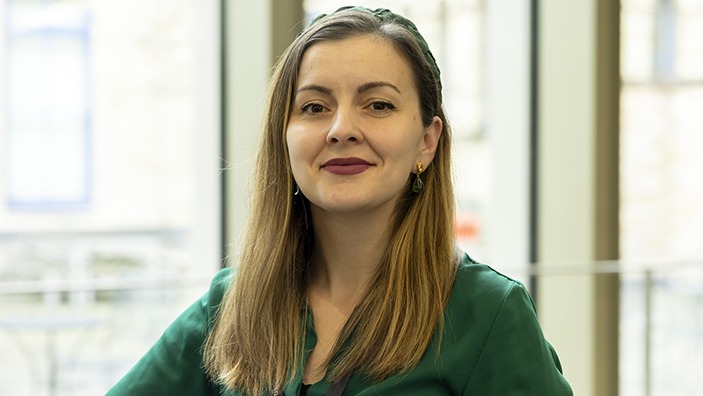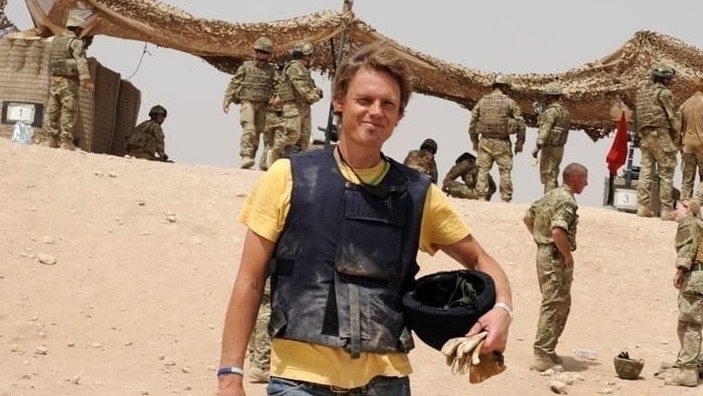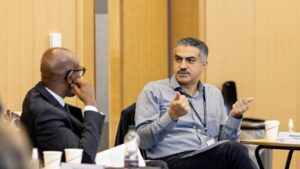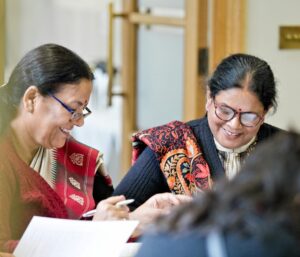The Cambridge Negotiations Lab
A practical, experiential workshop exploring the conflicting and shared interests that lie at the heart of every negotiation and which must be resolved to secure negotiating success.
Upcoming programmes
Format:
Dates:
Duration:
Fees:
Face-to-face
2-3 Mar 2026
2 days
£4,000 + VAT
Face-to-face
30 Apr-1 May 2026
2 days
£4,000 + VAT
Face-to-face
9-10 Jul 2026
2 days
£4,000 + VAT
Face-to-face
10-11 Sep 2026
2 days
£4,000 + VAT
Upcoming programmes
Format:
Face-to-face
Dates:
2-3 Mar 2026
Duration:
2 days
Fees:
£4,000 + VAT
Format:
Face-to-face
Dates:
30 Apr-1 May 2026
Duration:
2 days
Fees:
£4,000 + VAT
Format:
Face-to-face
Dates:
9-10 Jul 2026
Duration:
2 days
Fees:
£4,000 + VAT
Format:
Face-to-face
Dates:
10-11 Sep 2026
Duration:
2 days
Fees:
£4,000 + VAT
Overview
Join an innovative experiential learning environment and learn to negotiate better outcomes.
The Cambridge Negotiations Lab is designed to improve your ability to negotiate through a range of different scenarios, from simple 2-party negotiations to complex multi-party situations. This hands-on workshop is deliberately structured around the three key tensions that exist within most negotiations: creating and distributing value, defining the interests of the principals and their agents, and empathising with another’s point of view and asserting your own. Learn how to manage these tensions, whether they involve trade-offs or creatively leveraging differences.
Experiment with increasingly challenging scenarios. Respond in the moment, reflect on your performance and receive constructive feedback from those best placed to provide it: the very people you are negotiating “against”. You will leave with greater self-understanding and the confidence and tools to secure better, more effective results.
Benefits and career impact
Ensure the best possible outcome from any negotiation.
- Identify your strengths and weaknesses as a negotiator.
- Establish what effective (and ineffective) negotiating looks like.
- Recognise “bad behaviours” in negotiations and how to respond to them.
- Develop the mindset to approach complex scenarios and the confidence to take on any conflicts.
- Acquire a tried-and-tested toolkit that you can put to work straight away.
- Receive a digital certificate of completion from Cambridge Judge Business School Executive Education.
- Cascade your learning through your team.
- Improve negotiating competencies for your organisation.
- Secure better negotiating outcomes for your organisation.
Read more about the programme from our faculty, Mark de Rond.
Relationships are as fragile as they are valuable. They are key to achieving much of what we want from life and work and curating them requires skills. One such skill is negotiation. Whether contracting actors for a Beyoncé production, securing the release of hostages during a tense standoff, or “simply” resolving conflict at work or home, the skills involved are fairly similar. This “lab” aims to make a difference to whatever matters most to you: more effective deal-making, resolving conflict, or more meaningful, amicable relationships at work or home. You will experiment with increasingly challenging negotiations and receive first-hand feedback. You will leave with more self-understanding, greater self-confidence, and a set of tools you can use right away. All we ask is that you come prepared to roll up your sleeves, to support others as they seek to become more effective negotiators (as they will support you), and to be fully present.
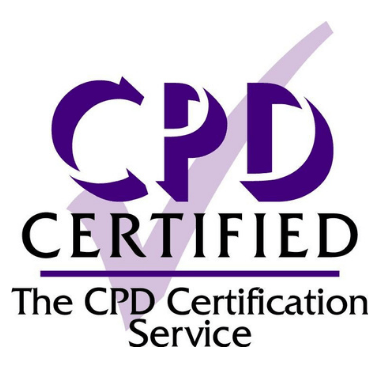
This programme is certified by the CPD Certification Service. It may be applicable to individuals who are members of, or are associated with, UK-based professional bodies.
Programme content
Learn the techniques and approaches to tackle difficult and challenging scenarios and the tools to secure more effective outcomes.
Modules 1: Introduction to negotiation: critical elements of successful negotiations
- Experiment with different negotiation styles and techniques in a safe space.
- Learn what throws you off-balance in negotiations.
- Participate in the Salt Harbour negotiation, based on a real-life scenario.
- Manage conflict by reconciling different interests and objectives.
- Use anchoring techniques in zero-sum negotiations.
- Identify zones of possible agreements and walkaway positions.
Modules 2: From zero-sum bargaining to win-win
- Prepare for a fictional negotiation using a 9-step framework.
- Simulate the dialogue between a high-tech medical firm and a small family business as they prepare a joint proposal for an international business venture.
- Analyse the negotiators’ dilemma: learn which strategies to use and when.
- Identify how to create and distribute value in win-win negotiations.
Modules 3: Reconciling tensions and relationships in multi-party negotiations
- Formulate a strategy for multi-party negotiations.
- Test new negotiation techniques and approaches.
- Identify how coalitions influence the negotiation process.
- Evaluate the changing nature of each party’s best alternative to a negotiated agreement.
Modules 4: Advanced multi-party negotiations: building consensus
- Learn to balance empathy and assertiveness in multi-party negotiations.
- Negotiate a particularly difficult scenario: rebuilding the World Trade Center post-9/11.
- Vary your negotiation style in response to changing situations.
How you learn
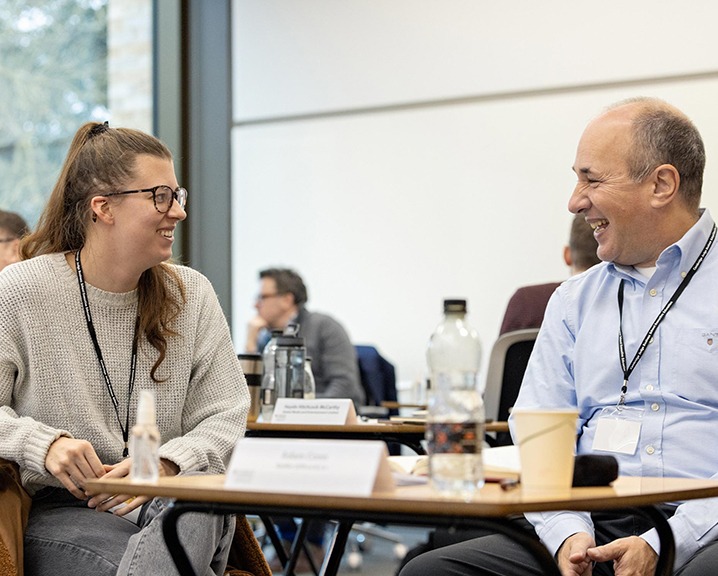
Face-to-face
Face-to-face is a traditional, intense classroom learning experience and is all about hands-on interaction. You will be a part of exercises, debates and conversations, engaging directly with our faculty and your peers. Conversations spill over into breaktimes and meals, forming lasting connections. Share your ideas, develop your network and grow professionally, whilst enjoying the historic city of Cambridge.
Who attends
Make an impact at the negotiating table. The Cambridge Negotiations Lab is for:
- executives seeking out best practice to drive their organisation’s negotiating performance
- those with little or no formal training in negotiations
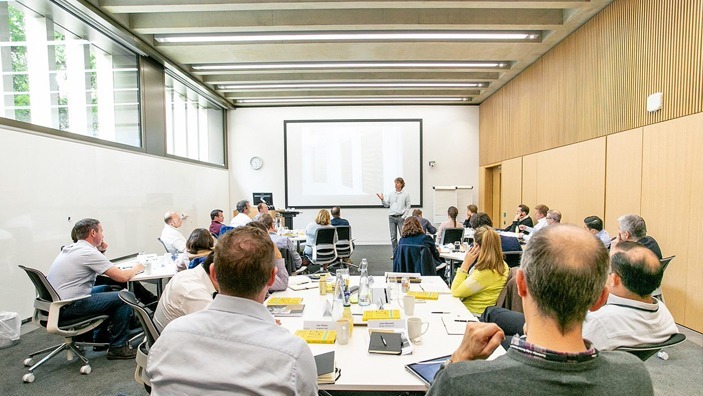
Met my expectations to structure my thinking about negotiations, gain cutting-edge concentrated knowledge and work on emotion control.
Faculty and speakers
Learn from our world-class faculty who bring fresh insights from their leading-edge research into all of our Executive Education programmes. The Academic Programme Director (APD) for the Cambridge Negotiations Lab programme is Professor Mark de Rond.
DPhil (University of Oxford)
Why Cambridge Judge Business School?
Related programmes
The Cambridge Negotiations Lab belongs to our Managing Organisations-topic executive education programmes. Here are a selection of related programmes:
Strategic Decision-Making for Leaders
Learn to think strategically, lead through uncertainty and improve the quality of your decision-making at every level.
Business Analytics and AI: Decision-Making Using Data
Drive your organisation’s future by harnessing the power of data, gaining the tools to build expertise in analysis, trend-spotting and bias-avoidance.
Leading Strategic Projects Successfully
Learn to embed projects within an organisational context, mastering complexity and uncertainty, managing stakeholders and leading and motivating your teams.
Speak to a programme advisor
If you have any questions or would like to discuss how this programme could benefit you or your organisation, please get in touch with the programme advisor.
